ROME — Pope Francis warned Saturday of “the worsening of multiple converging political and environmental crises,” singling out “hunger, climate, nuclear weapons.”
In his address to a delegation from the Paris-based Fondation Leaders pour la Paix, the pope praised the group’s “honorable, peace-loving leaders from various parts of the world” while highlighting the “particularly critical historical moment” in which we live.
“Unfortunately, the pandemic has not yet been overcome and its economic and social consequences, especially for the lives of the poorest, are heavy,” the pontiff lamented, noting how the Wuhan coronavirus has “sown much desolation and increased tensions.”
“The challenge is to help rulers and citizens to address critical issues as opportunities,” Francis told the delegation while holding up climate change as a prime example of a world crisis.
Certain situations of “environmental crisis,” he said, “unfortunately aggravated by the pandemic, can and should provoke a more decisive assumption of responsibility, first of all by the highest leaders, and afterward, flowing down to intermediate levels and the entire citizenry.”
The pope went on to note that in the case of effective reactions to climate change, “we see how it is not infrequent that solicitations and proposals come ‘from below,’” reiterating his belief that young people are the most important catalyst in the fight against global warming.
In an address in 2018, the pope similarly underscored what he considers two main threats to humanity, namely the “immense crisis” of global warming and the possibility of nuclear war.
On that occasion, the pope urged his listeners to do all they can to tackle the most pressing threats facing the planet, noting that in the first place, there is “the immense and ongoing crisis of climate change and the nuclear menace.”
Last year, Francis insisted it is “evident” that climate change is to blame for a number of humanity’s most serious social ills.
“It is evident that climate change not only upsets the balance of nature, but causes poverty and hunger, affects the most vulnerable, and sometimes forces them to leave their land,” the pope said:

One of some of 30,000 people demonstrates on December 12, 2009 in the center of Copenhagen to turn up the heat on world leaders debating global warming at the UN climate conference. Some 300 youths shrouded in black threw bricks and smashed windows during the demonstration, prompting swift arrests as some 50 policemen in riot gear intervened AFP PHOTO / ATTILA KISBENEDEK (Photo credit should read ATTILA KISBENEDEK/AFP/Getty Images).
In Saturday’s address, the pope went on to reiterate his belief in the need for greater multilateral dialogue to counteract the crises of the day.
The pandemic, he continued, “with its long aftermath of isolation and social ‘hyper-tension,’ has inevitably also undermined political action and politics itself.”
Even the breakdown of politics can be a blessing in disguise, he reflected, because it allows for the promotion of a better politics capable of enabling “development of a global community of fraternity based on the practice of social friendship.”
At the level of institutions, “it is urgent to encourage multilateral dialogue and collaboration because multilateral agreements guarantee the care of a truly universal common good and the protection of the weakest states better than bilateral ones,” he proposed.
Follow @tdwilliamsrome
